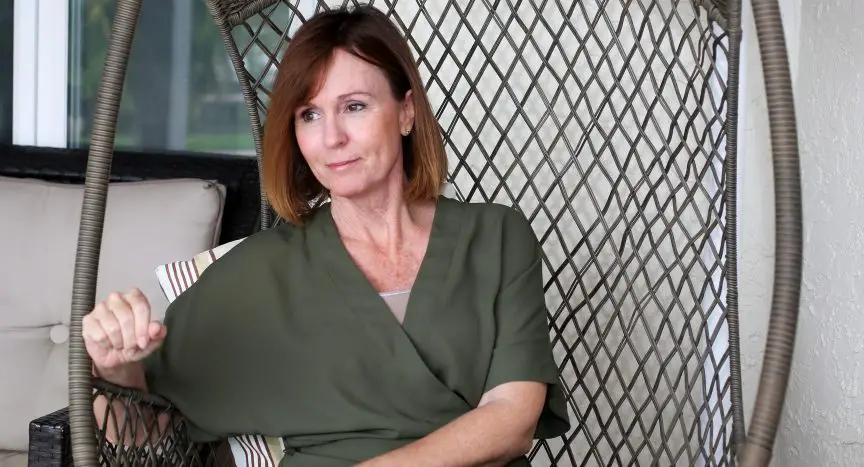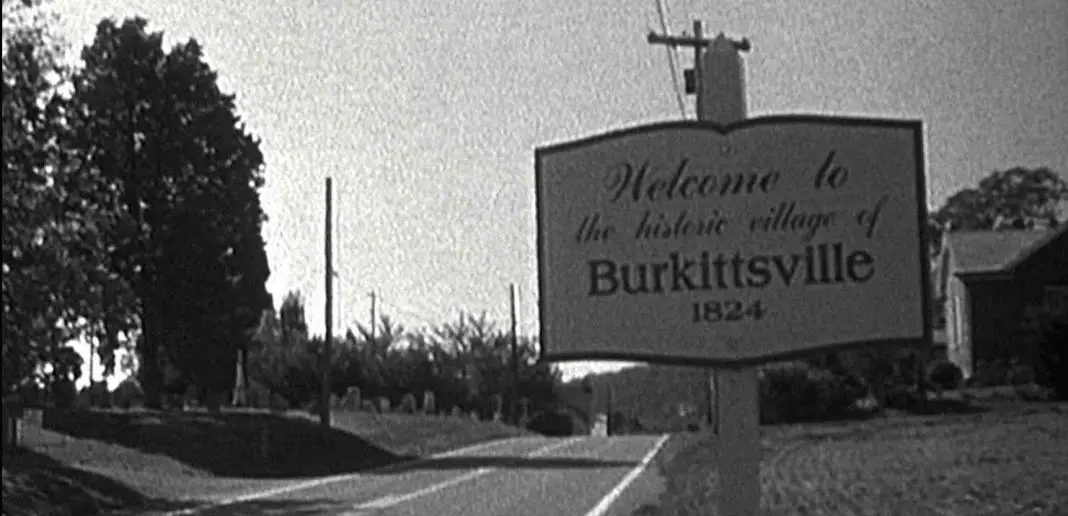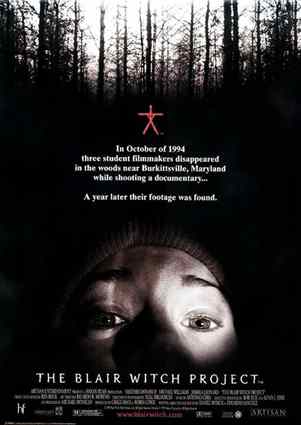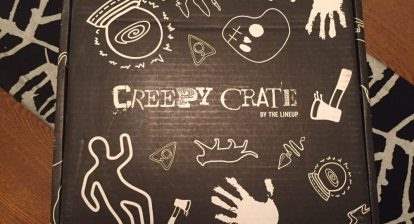Welcome back to Written in Blood, an interview series featuring novelists and screenwriters in the horror genre.
The state of Florida is often stereotyped: A land of gators and lanais, orange groves and Disney World; a place the elderly escape to when it’s time to retire. But beneath its warm weather and tourist trappings lies a place with a dark past and darker secrets. As for the people who know them? These are the characters Lori Roy explores in her new novel, Lake County.
Lake County takes place in 1950s Florida and follows Addie Anne Buckley, a teenager whose big dreams—and famous Aunt Jean (known to the world as Marilyn Monroe)—lead her on a collision course with some very dangerous men.
Don’t be fooled by the novel’s sunny setting and charming locals. Roy, who won Edgar Awards for Bent Road and Let Me Die in His Footsteps, is no stranger to suspense. Whether writing about buried bodies, mysterious disappearances, small Southern families, or the dark secrets they keep, Roy makes it known that horrors lurk behind the most seemingly innocuous places.
I sat down with Roy to talk about the inspiration behind Lake County, its real-world counterpart, incorporating Marilyn Monroe into the novel, the film that scared her the most, and more.
Wicked Horror: In Lake County, you did something I wouldn’t touch with a ten-foot-pole: incorporating arguably one of the most iconic celebrities—Marilyn Monroe—into a novel. But her integration is very seamless and organic, and she has her own arc. Were you worried about executing it in a way where it didn’t feel like a gimmick?
Lori Roy: Yes. That was exactly how I thought about it. Initially, when I was thinking about that character, I was gonna fictionalize more of a B-movie actress. I have this book that I bought which is all about the history of B-movie actresses. It’s called Scream, I think. You know, they were in all those, like…the gorillas carrying the damsel in the swamp, or the aliens are taking the damsel. They were all damsels. In St. Pete…there’s this giant, two-story mural of Marilyn Monroe. And it’s a very strong Marilyn. It’s Marilyn in the black turtleneck. It got me to thinking what if [the B-movie actress] was just Marilyn? And the only way I would do that is if I knew she wasn’t a gimmick. And so, I just dove in and started writing her. And the first clue that I was onto something authentic was how easily her character kind of showed herself to me. She showed the good sides, the bad sides, the generous, the spoiled, the manipulative. It was all just so accessible. And then the real task was, did she have something to say that no other person [or] character could say? And she carries, really, two of the greater themes of the book. She fully carries them, almost. Not entirely, but…she was like, “Hell yes, I’ve got something to say.” And that made me comfortable that she was not a gimmick because I didn’t want her to be a gimmick.

WH: So, when you were seeing that mural, or you had the idea of incorporating Marilyn into the novel, did Marilyn come first or did Lake County as a whole come to your mind as a seedling first?
Lori Roy: Lake County came first. The whole story wasn’t realized, but the idea of my protagonist Addie…I had her and I knew she was going to try to escape this small-town life by following her famous aunt, and then who that famous aunt was—and how I created her—that’s where I kind of had to tackle [writing her]. I’ve never written a real person into a book. I’ve never really used a real person as inspiration for a fictional character, and I’ve certainly never done this.
WH: I’m not surprised to hear that because the book has a very strong sense of place. The book isn’t called Norma Jean, or Marilyn Monroe, or even Addie Anne. It’s Lake County. How important was it to have Lake County be its own character?
Lori Roy: It was very important. I was drawn to that area. I’ve been there several times. I’ve gone on book tours there and vacationed there. Gilbert King wrote many great books that specifically tackle that area of Lake County. It has a very disturbing past. His work really inspired me to spend some time in Lake County. I created a very different Lake County at that point in time because I give Lake County a very different sheriff than they had.
WH: There’s a juxtaposition between the cheery content of the book—the weather, the orange blossoms, and even the cover looks very inviting—and its nontraditional horrors. There’s mob violence, domestic violence, and what you refer to in the novel as “the rot beneath the shine.” How important was it to have the juxtaposition of these horrific things with the warm people and sunshine-y setting of Lake County?
Lori Roy: Well, that’s sort of Southern Gothic in a nutshell. It’s the beauty of the South butting up against the horrors of the South. You know, we have the beautiful food, music, landscape, architecture, and the very ugly history that is at the heart of Southern Gothic.

WH: And a lot of the horrors that we see are in the character Siebert. We get the hints of what he’s done to Norma Jean, and there’s a scene where he poses a threat to a child that I think is the book’s most horrific. It shows what I think you’ve discussed as being the theme of the book where Siebert is physically strong, but he’s so incredibly weak. So, at what point of the writing process did the theme of true strength come about? Because the women are much stronger than Siebert actually is.
Lori Roy: Yes, thank you for pointing that out. Almost twenty years ago, I was [at Eckerd College] as a student, and Stephen King was there to speak, and he talked about theme and he said something that really resonated and it’s been my probably primary guiding principal since: when you’re writing your first draft, don’t think about theme. Write to your characters. Write what their motivations [are that] drive the story. So, write your story, write your characters, and then if somewhere along the way the theme starts to bubble up, think about that on your subsequent drafts. It’s a real leap of faith because with every book pretty much I’ve written, I had no idea what the theme was. One book, I didn’t know until it had a hardback cover on it and a friend of mine said something, and I was like, “Oh, that’s what the book’s about.”
So, when I started to get a sense of that difference between power and strength was when Addie started to see her mother as the person she was before she was a mother. And she started to recognize strength where she before had just seen a life she wanted nothing to do with. And Siebert, of course, represents power, but he’s gotten that power through coercion, abuse, manipulation, and he is so desperate to cling to it. So, all that to say [theme] comes to me near the end of a book when I start to understand what it’s about, and then I know that it’s not a concocted theme. I’m not writing to the theme. I’m just writing these characters and they’re living out this theme.
WH: Addie’s mom says, “Real life isn’t like a movie. You never know when you’re in the middle or when you’re near the end. And you never get a second take.” Addie is a little naïve with her vision of Hollywood. How important was it to have Addie come in and be a naïve character, with Marilyn Monroe as somebody who’s representing this big Hollywood dream she’s had for so long?
Lori Roy: We’re talkin’ 1954—a young woman who has not ever been outside her small town. That was who she would be. But she was also, whether or not her dream was a good dream to have, she was dedicated to it, and she worked hard, and she was committed, and she’d been studying…so, she had those sort of two different traits—being naïve, and that she’s not been anywhere or experienced anything. And [she had] not been really challenged in her life because she came from a solid family. But she had watched Marilyn over the years come in with these struggles [of depression]. And so, by the time she needs to have some strength, she understands some of the world through what she’s seen Marilyn bring into the home.
WH: And she didn’t really notice that until, toward the climax of the story where she has that change of heart where she thinks, Maybe strength isn’t what I thought it looked like.
Lori Roy: Well, and I think that’s a theme in a lot of my books. I think that’s what I’m drawn to writing about—women who are ordinary women. None of these women have superpowers. They’re not, you know, police officers. They’re not martial arts experts. They’re, you know, women raising children, going to school. Marilyn was, of course, maybe the greatest icon ever, but in this small town she was Jean. The strength that they demonstrate day in and day out is not necessarily the strength that we celebrate. We’re more inclined to celebrate power, which I think is not what needs to be celebrated. I think it needs to be checked and challenged. True strength is what we need to celebrate.

WH: And speaking of strength, there are so many instances in the novel where, either through physical strength or tenacity, the characters do something where you think, “How the hell are they going to get out of this?” I’m wondering how you managed to keep these surprises fresh and avoid writing yourself into a corner.
Lori Roy: Yeah, that’s always the trick. These characters—I would say every character in the book—came to me pretty easily, what was unique about them. And then you want to leverage what is unique about them in their story. We all do that. We play to our strengths, right? And there’s a lot of sitting around and thinking. […] Sometimes I sit with my husband at cocktail hour and I’m like, “I gotta figure out a way to get someone out of a locked garage with no windows,” or you know, whatever it is.
Did You Know? Wicked Horror TV Has Classic and Independent Horror Films Available to Stream for Free!
WH: Did any films specifically, maybe even those of Marilyn Monroe, influence the writing process, or even the seed generating for Lake County?
Lori Roy: No, I guess probably the way that film influenced my decisions was I did watch a lot of Marilyn’s movies. Watched a lot of interviews that she gave. Tried to find moments where she was speaking in her regular voice, which is very difficult to do. And the thing that I kept coming back to is every movie she was in, she just outshined everything on the screen. And I knew that bringing her into my book, I could notgive her a point of view because she would’ve taken over the narrative. She’s just that big of a presence. So, I made that decision early on. I wasn’t sure how big of a character she would be in the book, but I knew I couldn’t give her a point of view or she would just overshadow everything.
WH: She does have her own arc, but you almost just lightly sprinkle her in. When she does walk onto the scene, she’s very present and you’re very aware of her. It kind of heightens whatever’s happening.
Lori Roy: I wanted to create the one situation—the one place in the world—where she was just Jean. And you get a glimpse of how some people in the community don’t necessarily honor that as she’s gotten more and more famous. But I wanted that for her—a place where she was just a woman with a family who loved her, who could go to the store, and didn’t have to do her hair if she didn’t want to. And the people who loved her loved her because she was Jean to them, and not this asset that they were trying to leverage. I didn’t know if I could do it—if she would come on and just be so large in the story.
WH: Without getting into spoilers, the ending reminded me of Tarantino’s Once Upon a Time in Hollywood. Did you always plan for your Marilyn to diverge from the real Marilyn’s story?
Lori Roy: No, I didn’t. But I didn’t know until I sat down to write the final chapter where she was gonna go with her life and with her career. So, yeah, that was a surprise to me, too. And that’s always fun when you can have that moment as a writer.
WH: Is there anything in the suspense, crime, or horror genre you’ve seen or read recently that you’d recommend?
Lori Roy: Oh, gosh, I should’ve thought ahead on this. I read [“The Box” by Jack Ketchum] years ago and I still think about it. I asked the author himself once, “Literary bullshit aside, what’s in the box?” And he wouldn’t tell me. So, I always like to recommend that story. An Honest Man [by Michael Koryta] is a great book. He’s an Edgar nominee for that book. I like to recommend that one.
WH: How about on the film side?
Lori Roy: The film that scared me more than anything—The Blair Witch Project. We were here in Florida and we saw it at a little 1920s theater, and actually the two writers and, I guess, producers, happened to be there that night. And I think the thing that scared me the most…the more you can picture yourself in something, the more terrifying it is, or the more relatable. That one, I went to sleep afraid and I woke up still feeling that same fear. And to this day, I can’t watch it again.
WH: I’m guessing no camping for the Roy family.
Lori Roy: But, you know, I guess I don’t do a lot of horror. The kind that is horror for horror’s sake, or just suspense for suspense’s sake, I don’t stay terribly engaged. So, I think that’s why Blair Witch was very, I don’t know, it just felt like that could be anybody on their camping trip.
WH: Is there anything you’re working on now?
WH: Are you someone who likes to keep it in your head until the draft is done?
Lori Roy: I can say the next book is present day and we’re still stickin’ in the South.
Lake County is on sale now.
[This interview has been edited for length, content, and clarity]





